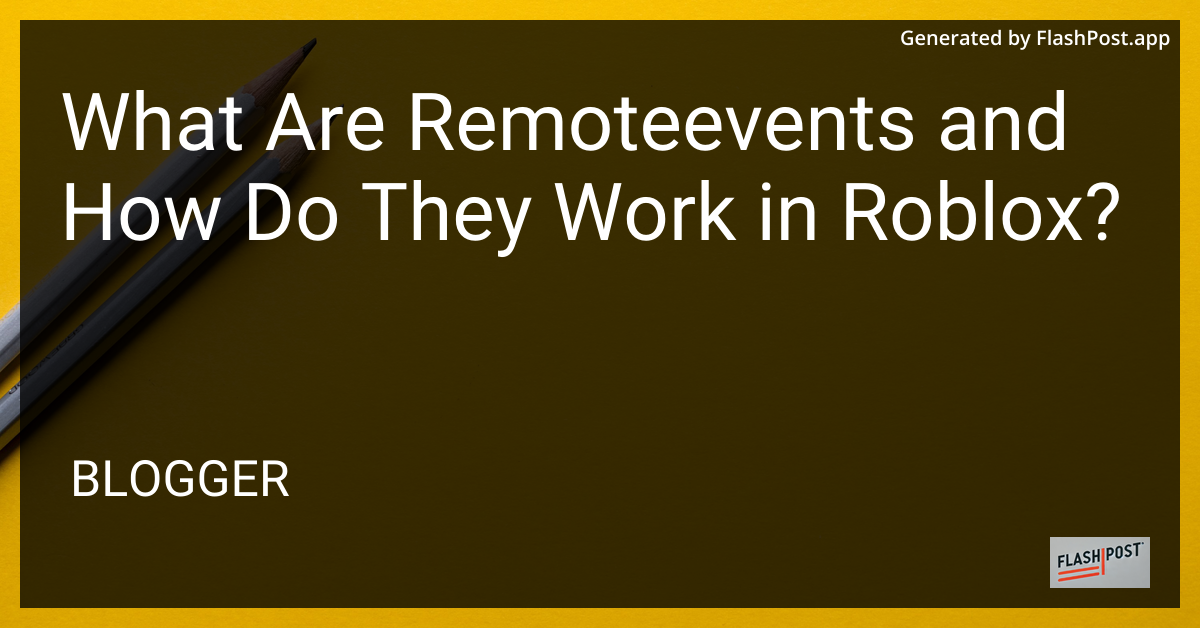What Are Remoteevents and How Do They Work in Roblox?

What Are RemoteEvents and How Do They Work in Roblox?
RemoteEvents are a fundamental part of Roblox game development, enabling seamless communication between the client and server. Understanding how they operate is crucial for creating immersive, dynamic games. In this article, we will explore what RemoteEvents are and delve into how they function within Roblox.
What Are RemoteEvents?
In Roblox, RemoteEvents are objects used to send messages between client and server scripts. They play a vital role in creating interactive and responsive game mechanics. RemoteEvents allow developers to trigger actions on the server from the client and vice versa, making them especially useful for features such as multiplayer interactions, server-side game logic, and secure data handling.
How Do RemoteEvents Work?
Initiating RemoteEvents
RemoteEvents can be incorporated by first placing a RemoteEvent object in the game’s ReplicatedStorage or any other suitable service where both server and client scripts can access it. Once the RemoteEvent is set up, you can write functions on both the client and server to send and receive messages.
Client to Server Communication
When a player performs an action that requires server validation or processing, you can use a RemoteEvent to send a signal from the client to the server. For instance, shooting a gun in a game might need to be verified by the server to prevent cheating. Here’s a simplified example:
-- Client-side script
local ReplicatedStorage = game:GetService("ReplicatedStorage")
local FireRemote = ReplicatedStorage:WaitForChild("FireRemote")
local function onFire()
-- Trigger the RemoteEvent
FireRemote:FireServer("BulletData")
end
-- Bind the function to mouse click or any action
mouse.Button1Down:Connect(onFire)
Server to Client Communication
Conversely, the server can use RemoteEvents to inform the client about important updates, like game results or environmental changes. This ensures all players have a consistent experience:
-- Server-side script
local ReplicatedStorage = game:GetService("ReplicatedStorage")
local GameUpdateRemote = ReplicatedStorage:WaitForChild("GameUpdateRemote")
local function updateGameState(updateDetails)
-- Notify clients of the latest game state
GameUpdateRemote:FireAllClients(updateDetails)
end
Best Practices for Using RemoteEvents
Security First: Always validate any data received on the server-side to prevent exploitation. Clients can send any data to the server, so it’s crucial to implement thorough checks.
Maintain Efficiency: Limit the frequency and size of data transferred between client and server. Overusing RemoteEvents can lead to performance issues.
Organization and Documentation: Keep your codebase organized by naming RemoteEvents clearly and documenting their intended use. This practice helps in maintaining and scaling your game.
Exploring Further Resources
For those who are serious about advancing their skills, it’s recommended to explore additional resources. Consider checking out scholarships for roblox game developers to potentially fund your learning journey. Additionally, if you’re seeking affordable roblox programming books, or are interested in a comprehensive roblox game development tutorial, these resources could be invaluable.
Conclusion
RemoteEvents are indispensable for building robust and interactive games in Roblox. By understanding and implementing them effectively, developers can create rich, engaging experiences for players. Remember to prioritize security, maintain efficiency, and organize your code to harness the full potential of RemoteEvents in your next game project.
Comments
Post a Comment